The two most common questions I hear about stocks are:
- What stock should I buy?
- When do I sell?
I’ve covered the first question before (check out my article all about stocks and bonds). That’s why I want to answer the second question: When the heck do you sell your stocks?
When to sell stock: 3 reasons to sell
As with all things personal finance, there’s no one-size-fits-all answer — but there are good indicators of when you should sell. These indicators are going to differ depending on your age.
If you’re closer to (or at) retirement age, you’ve likely been investing for a while and can sell your investments to live off of for your retirement.
If you’re younger, though, this isn’t the case. In fact, if you’re in your 20s and 30s, there are three reasons to sell your investments:
- You need the money for an emergency.
- You made a terrible investment and it’s consistently underperforming the market.
- You’ve achieved your specific goal for investing.
Let’s take a look at each reason now and break down what they look like.
Reason #1: You need money for an emergency
If you encounter an unexpected expense and you absolutely need money to cover it, it might be a good idea to sell your stocks. I’m talking about situations like:
- Medical bills
- Financial/identity theft
- Car repairs
- Home repairs
- Economy crashes
- You lose your job
We get that things happen, but it’s almost never a good idea to sell your stocks. You should be making investments for long-term savings goals such as retirement. You should already have a safety net in place just in case of emergencies.
If you suddenly need money for an emergency, here’s your hierarchy of where to get it before resorting to selling stocks:
- Use the money in your savings account. I have six months of cash for this very reason. This money provides me with peace of mind because I know I’ll be able to withstand the pressure if I ever need to use it.
- Sell any valuables that aren’t critical to you. Use eBay. I’ll be honest: You probably won’t get a lot of money from selling valuables (people have a tendency to overvalue their own property compared with what others will pay for it). But selling some of your own goods is an important psychological step — it will let you prove how serious you are both to yourself and to your family (which will help if you’re asking them for help).
- Ask your family if you can borrow the money from them. Note: This doesn’t work if your family is crazy.
- Liquidate your investments for money. Now is when you can sell your stocks for money. You can always withdraw the principal you contributed to your Roth IRA penalty-free, although you’ll be severely retarding your money’s ability to compound over time.
With a 401k, you can take money out for “hardship withdrawals,” which typically include medical expenses, buying a home, tuition, preventing foreclosure, and funeral expenses, but you’ll probably still pay early-withdrawal fees.
If it comes to this, consult your HR representative. But I urge you to avoid cashing out your retirement accounts because of the penalties and taxes involved.
- Use your credit card only as a last resort. I can’t emphasize this enough: The chances are very good that your credit card will gouge you when you repay it, so don’t do this unless you’re truly desperate.
Be sure to check out my article on how to build an emergency fund for more.
Reason #2: You made a terrible investment that’s consistently underperforming
This point is largely moot if you invested in an index fund or series of index funds, because they reflect the entire market’s performance. If it’s going down, that means the entire market is down.
If you believe the market will recover (which it will), that means investments are on sale for cheaper prices than before, meaning not only should you not sell, but you should keep investing and pick up shares at a cheaper price.
But let’s talk about this conceptually to understand when to sell an investment for poor performance. If you pulled up a list of your investments and saw this chart, what would you do?
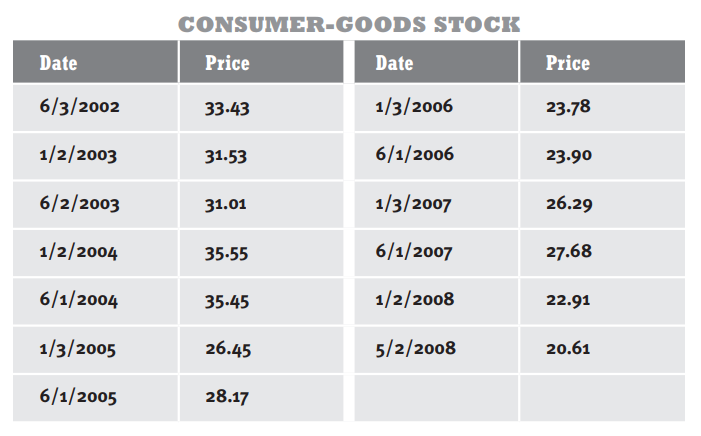
“Holy crap,” you might be saying. “That’s a crappy stock. I need to sell it before I lose all of my investment!”
Slow down. Instead of freaking out and selling your stock faster than you can scream, “SELL! SELL! SELL!” into a phone, look at the context.
Knowing that the example is a consumer-goods stock, how is the rest of the consumer-goods industry doing?
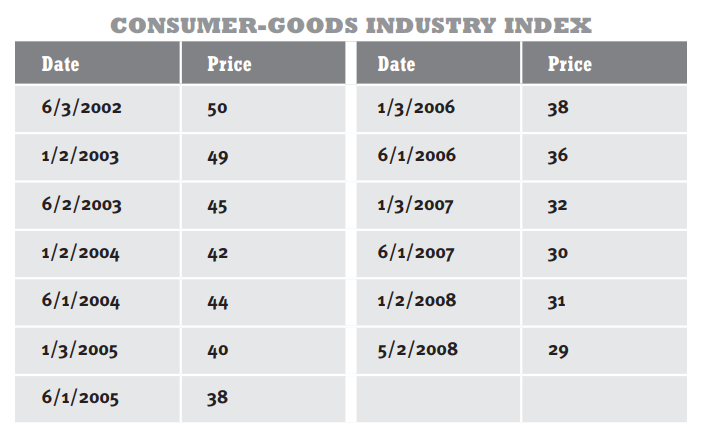
By looking at the stock and the surrounding industry, you see that the entire industry is in decline. It’s not your particular investment. They’re all doing poorly.
Now, this raises questions about the industry, but it also gives you a context to explain your stock’s plunging returns. And just because they’re plunging, by the way, doesn’t mean that you should sell immediately.
All industries experience declines at one time or another. In fact, looking at the chart above, I’d dig in more to see what was happening with the industry. Is it still viable? Are there competitors replacing it?
For example, if you own shares in a company that’s producing cassette-playing Walkmans, chances are that business is not coming back.
From looking at the above chart, it appears that the stock is performing in line with the rest of the industry. If you think the industry or investment is simply going through a cyclical downturn, then hang on to the investment and continue regular purchases of shares. If, however, you think the industry won’t recover, you may want to sell the investment.
Now let’s take a look at another example.
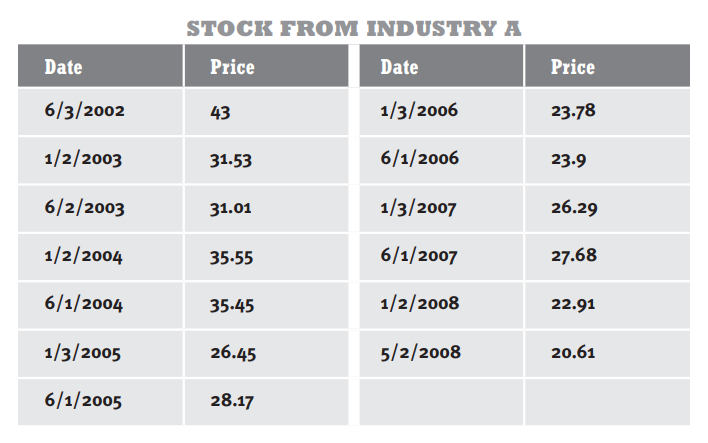
Just like the previous example, it’s not looking great — but how does it compare to the rest of the industry?
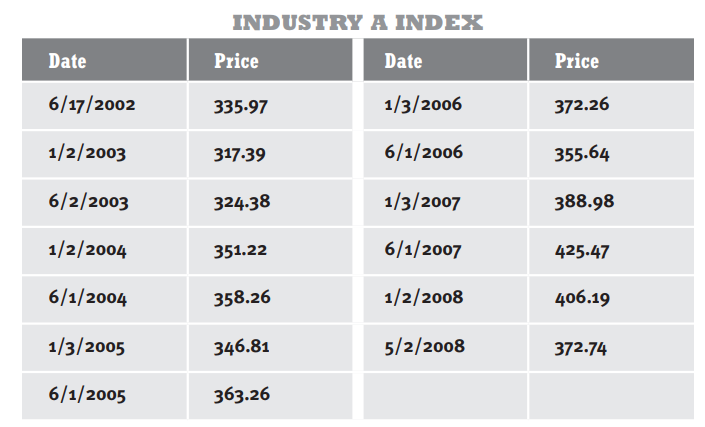
As you can see, this stock really had been underperforming against its industry index. I would consider selling this stock for sure.
I want to emphasize that I almost never have to sell investments because I rarely make specific stock investments. If you pick a lifecycle fund or build a portfolio of index funds instead, you rarely have to think about selling. My advice: Save your sanity and focus on more important things.
Reason #3: You achieved a specific goal
Buy and hold is a great strategy for ultra-long-term investments, but lots of people invest in the medium to short term to make money for specific goals.
For example, “I’m going to invest for a dream vacation to Thailand. I don’t need to take the trip any time soon, so I’ll just put $100 / month into my investing account.”
The best part? That money will compound and grow with a higher interest rate if you invest it into a diversified index like the S&P 500.
The average savings account offers 0.06% APY — whereas the S&P 500 returns around 8% each year! So for savings goals that are further into the future, there’s nothing wrong with “saving” in an investment account.
You shouldn’t do it for every savings goal, however. In fact, if your goal is less than five years away, you should set up a savings goal in your savings account. For more information on that, check out my article on sub-savings accounts.
If you’ve invested money for a longer term goal and you’ve achieved it, sell and don’t think twice. That’s a great investing success, and you should use the money for whatever your original goal was. You earned it, after all.
How to sell stock
Once you decide it’s time to sell an investment, the process is easy.
Simply log into your investment account or call your broker, browse to the investment you want to sell, and then click “Sell.”
If you’re selling outside of a retirement account, there are many tax implications, such as tax-loss harvesting (which lets you offset capital gains with losses), but since most of us will invest all of our money in tax-efficient retirement accounts, I’m not going to get into these issues here.
Bottom line: Don’t sell your stock if you can help it
Remember: Don’t just sell because your stock dropped. Look at it in context.
I used to teach a class on finance. One day, I went in front of the classroom and drew a picture of a declining stock on the chalkboard. It looked like this:
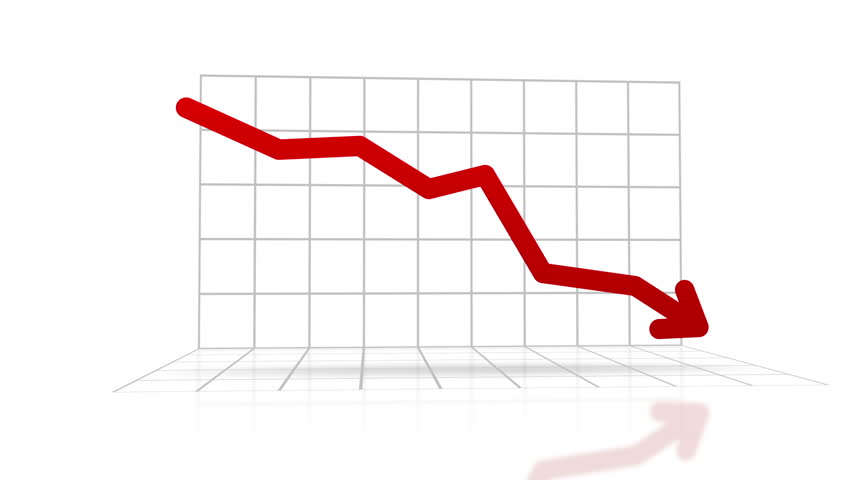
Then I turned to the class and asked them, “What should I do?”
Part of the class shouted, “Sell!” and another section said, “Hold it!” while a couple of people in the class muttered “Buy more.”
None of them were exactly right though. The truth is, you need more context.
If a stock like, say, Apple falls a bunch, you have to look at the surrounding context and ask questions like:
- Is the general market falling?
- Are its peers falling?
- Has Apple performed this way before? What happened then?
Answering these questions provide a LOT more context to the situation and can both put your mind at ease and also help you make better judgments.
My suggestion to keep tabs on your stocks would be to just set up alerts through your broker or Google News to be notified of major industry changes.
BUT you need to keep in mind that 99.999999% of the advice you see out there is pure fearmongering.
Two things to always keep in mind when it comes to stocks:
- The professionals are almost always wrong. The stock picks of pundits are usually no better than pure chance, and even professional money managers barely ever beat the market benchmark. In other words, they don’t just underperform but they do it by A LOT.
As William Bernstein, author of The Intelligent Asset Allocator, says: “There are two kinds of investors, be they large or small: Those who don’t know where the market is headed, and those who don’t know they don’t know.”
- It’s mostly just noise. The fact is if you’re a long-term investor (and you should be), you don’t need to check your stocks every day. You don’t even need to check your stocks every WEEK.
The daily changes in stocks are almost always noise — plain and simple. And very few (read: almost none) of your investments will be determined by the news of one day.
The best investment you can make
Your financial situation is unique to you. That’s why there’s no one-size-fits-all solution for when you should sell your stocks. It’s your money — and it’s up to you to decide at the end of the day.
But it can be confusing if you’re new to this world and have no idea how to get started.
That’s why I’m excited to offer you something for free: My Ultimate Guide to Personal Finance.
In it, you’ll learn how to:
- Master your 401k: Take advantage of free money offered to you by your company … and get rich while doing it.
- Manage Roth IRAs: Start saving for retirement in a worthwhile long-term investment account.
- Automate your expenses: Take advantage of the wonderful magic of automation and make investing pain-free.
With this guide, you’ll be well on your way to living a Rich Life. And you don’t need any fancy get-rich-quick schemes or snake oil or other BS “solutions.” All you need is determination and the right systems put in place to help you get the most out of your financial situation and not have to worry about living “frugally” (aka sacrificing the things you love).
Enter your info below and receive my FREE bonus video on how to reduce your debt today.
When to sell stock: 3 reasons to sell is a post from: I Will Teach You To Be Rich.
Via Finance http://www.rssmix.com/
No comments:
Post a Comment